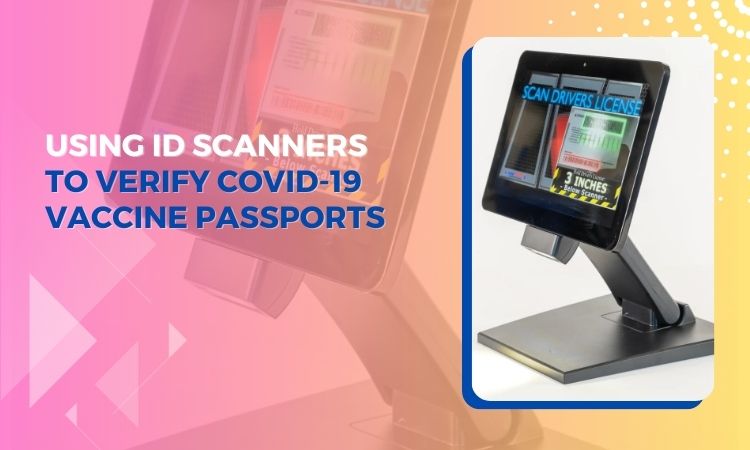As COVID-19 vaccines become more widely available, businesses and governments worldwide are implementing vaccine passport systems to verify vaccination status.
Vaccine passports prove vaccination, allowing individuals to access specific venues and events, travel internationally, and even return to work.
Many businesses and governments are turning to ID scanners to ensure the accuracy and authenticity of vaccine passports.
This article will explore the benefits and challenges of using ID scanners for COVID-19 vaccine passport verification.
What are COVID-19 Vaccine Passports?
COVID-19 vaccine passports are digital or physical records that verify an individual’s COVID-19 vaccination status. People use them to grant access to specific venues, events, and activities, and they may also require them for international travel.
Vaccine passports typically include personal information such as the individual’s name, date of birth, and vaccination dates.
The purpose of verifying vaccine passports is to prevent the spread of COVID-19 and ensure the safety of individuals in public spaces.
The Benefits of Using ID Scanners for COVID-19 Vaccine Passports
Using ID scanners for passport verification offers several benefits that can make the process more efficient and secure. Here are some of the key advantages:
- Faster and Smoother Verification: ID scanners can quickly scan and verify vaccine passports, allowing businesses to process more individuals in less time. This can be especially important for businesses that expect high volumes of customers, such as airlines or event venues.
- Enhanced Accuracy and Reliability: ID scanners are highly accurate and reliable, reducing the risk of errors or fraud. This can help ensure that only vaccinated individuals are granted access to certain venues or activities, which can help prevent the spread of COVID-19.
- Advanced Security Features: Many ID scanners offer advanced security features, such as encrypted data and biometric authentication, which protect individuals’ personal information and prevent identity theft. This can give individuals peace of mind when presenting their vaccine passports.
- Integration with Existing Systems: ID scanners can often be integrated with existing business systems, such as ticketing or access control systems. This can make it easier for businesses to manage vaccine passport verification alongside other tasks.
- Compliance with Local Regulations: Some cities, states, or countries may require businesses to verify COVID-19 vaccine status for entry or participation in certain activities. By using ID scanners to verify vaccine passports, businesses can ensure compliance with local regulations, reducing the risk of fines or penalties.
- Improved Customer Experience: Vaccine passport verification can be a stressful and time-consuming process for customers, especially if it involves manual verification of physical documents. By using ID scanners, businesses can streamline the verification process and improve the overall customer experience, which can increase customer satisfaction and loyalty.
Overall, using ID scanners for COVID-19 vaccine passport verification can offer many benefits for businesses and individuals alike. By implementing this technology, companies can help ensure a safe and efficient return to normalcy.
How Do ID Scanners Verify COVID-19 Vaccine Passports?
Identity scanners use advanced technology to read and verify vaccine passports. They typically scan the QR code or barcode on the passport to retrieve the individual’s vaccination status and other personal information.
ID scanners can also include biometric authentication, such as facial recognition or fingerprint scanning, to confirm that the individual presenting the passport matches the person whose information the passport records.
By using ID-card scanners, businesses and governments can verify vaccine passports quickly and accurately, without the risk of human error or fraud.
Also Read: The Best Barcode Scanner For Your Needs
Challenges of Verifying COVID-19 Vaccine Passports with ID Scanners
While using ID scanners for COVID-19 vaccine passport verification can offer several benefits, there are also some challenges to consider. Here are some of the key challenges:
- Compatibility with Different Types of Vaccine Passports: There are several different types of COVID-19 vaccine passports being used around the world, and not all ID scanners may be compatible with all types. Businesses may need to invest in multiple types of scanners or software to accommodate different passport types.
- Potential for Fraud or Hacking: While ID scanners can offer enhanced security features, they are not fool proof. There is always a risk of fraud or hacking, which could compromise personal information or allow unvaccinated individuals to gain access to restricted areas.
- Privacy Concerns: Some individuals may have concerns about their personal information being collected or stored by businesses or third-party providers. Businesses will need to be transparent about their data collection and storage practices to address these concerns.
- Technical Difficulties: Like any technology, ID scanners can experience technical difficulties or malfunctions. This could lead to delays or errors in the verification process, which could frustrate customers and negatively impact the customer experience.
Hence, businesses will need to be aware of these challenges and take steps to address them to ensure a smooth and secure verification process.
Tips for Businesses on Using ID Scanners for COVID-19 Vaccine Passports
If your business is planning to use ID scanner for COVID-19 vaccine passport verification, there are several tips you can follow to ensure a smooth and secure process.
First, consider investing in ID scanner or software compatible with multiple types of vaccine passports to ensure that you can accommodate the most extensive possible range of customers.
Second, prioritize security by choosing ID scanner or software that offer advanced security features, such as encryption, biometric authentication, and tamper detection. Also, train your staff to use the scanners and adequately handle potential security issues.
Third, be transparent with your customers about your data collection and storage practices, and comply with relevant privacy regulations. Consider offering customers the option to have their data deleted after the verification process is complete.
Finally, prepare yourself to troubleshoot any technical issues with the ID scanner or software and formulate a backup plan in case the technology fails. It may include having a manual verification process or staff on hand to help customers experiencing difficulties with the scanners.
By following these tips, your business can help ensure a smooth and secure vaccine passport verification process for your customers while protecting their privacy and maintaining compliance with relevant regulations.
Conclusion
Overall, using ID scanners to verify COVID-19 vaccine passports can benefit businesses and individuals.
From enhanced security and compliance with local regulations to improved customer experience and privacy protections, businesses that invest in ID scanners can help ensure a smoother and more efficient verification process.
However, it’s also important to be aware of the potential challenges and take steps to address them; so that businesses can help ensure a smoother and more efficient vaccine passport verification process while also protecting the privacy and security of their customers.












